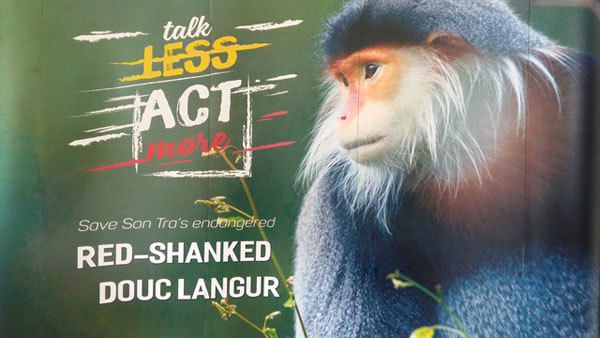
The Critical Ecosystem Partnership Fund (CEPF) announced that Le Thi Trang and nine other conservationists from around the world have been named 'Hotspot Heroes' for their efforts to protect the world's biodiversity hotspots.
The Critical Ecosystem Partnership Fund (CEPF) announced that Le Thi Trang and nine other conservationists from around the world have been named ‘Hotspot Heroes’ for their efforts to protect the world’s biodiversity hotspots.
Vietnamese conservationist honored as biodiversity ‘Hotspot Hero’
 |
| Le Thi Trang poses for a photo at an exhibition on the endangered red-shanked douc langurs (Pygathrix nemaeus) in Da Nang. She and nine other conservationists from around the world have been named ‘Hotspot Heroes’ for their efforts to protect the world’s biodiversity hotspots. |
CEPF said in a press release on Friday that the honourees were chosen from hundreds of civil society organisations that have received grants from CEPF in the 10 global biodiversity hotspots where the fund is currently active.
It said on this International Day for Biological Diversity (May 22), CEPF is recognising these heroes as part of the celebrations for its 20th anniversary. The fund empowers non-governmental organisations, indigenous groups, universities and private enterprises to protect the world’s biodiversity hotspots — the world’s most biologically diverse yet threatened terrestrial regions — and help communities thrive. CEPF does this through grants and technical support for conservation, organisational strengthening and sustainable development.
The Hotspot Heroes and the non-governmental organisations (NGOs) they work for are making outstanding contributions to the conservation of the hotspots. They exemplify the kinds of dedicated, dynamic people who work to ensure that intact ecosystems can continue to sustain flora and fauna and provide clean air, fresh water, healthy soils, sustainable livelihoods, resilience to climate change and much more.
Vietnamese conservationist honored as biodiversity ‘Hotspot Hero’
A photo of the endangered red-shanked douc langur (Pygathrix nemaeus) is displayed at an exhibition in Da Nang. The endangered primate species is preserved at the Son Tra Nature Reserve. — VNS Photo Cong Thanh
 |
| Trang is the vice director of GreenViet, an emerging Vietnamese non-profit organisation that has pushed the boundaries of what civil society organisations can aspire to achieve in the environmental space. |
In collaboration with others, GreenViet helped bring about one of the most remarkable conservation success stories in Vietnam: The campaign to save Son Tra Peninsula from uncontrolled tourism development. This campaign saved Vietnam's largest population of the endangered red-shanked douc langurs (Pygathrix nemaeus) and engaged people from all walks of life in the conservation movement.
“Trang was at the centre of the Son Tra campaign, bringing dynamism, creativity and inexhaustible energy. The work of Trang and GreenViet is an inspiration to me,” said Jack Tordoff, CEPF managing director, who also oversees the CEPF investment the Indo-Burma Biodiversity Hotspot, including Vietnam.
Trang graduated from the Da Nang University of Technology with a degree in environmental engineering. During that time, she volunteered for a local organisation investigating and reporting crimes related to wildlife in central Vietnam.
In her current role with GreenViet, Trang oversees initiatives related to education, public relations and development.
“The Hotspot Heroes represent the many tenacious, committed conservationists who are taking actions every day to ensure the future of the biodiversity hotspots and the people who depend on these vital ecosystems,” said CEPF Executive Director Olivier Langrand.
“They endure a multitude of challenges — long hours, gruelling travel, difficult working conditions, political hurdles and even threats to their lives — in pursuit of a healthy, sustainable world.”
“Trang and GreenViet are changing the way people in Vietnam value nature,” said Langrand. “They are bringing together communities, businesses and government to protect important ecosystems that are key to the country’s future.”
In 2013, Vietnamese biologists Nguyen Ba Quyen were included in the top nominations with conservation of Golden snub-nosed monkey (Rhinopithecus avunculus).
CEPF is a joint initiative of l'Agence Française de Développement, Conservation International, the European Union, the Global Environment Facility, the Government of Japan and the World Bank.
Since 2001, CEPF has catalysed enduring, locally led biodiversity conservation through US$250 million in grants to more than 2,400 organisations in 98 developing and transitional countries. Results include more than 15 million hectares of formal protected areas established, at least 890 globally threatened species protected, and more than 3,500 communities benefiting.
(Source: VNS)





